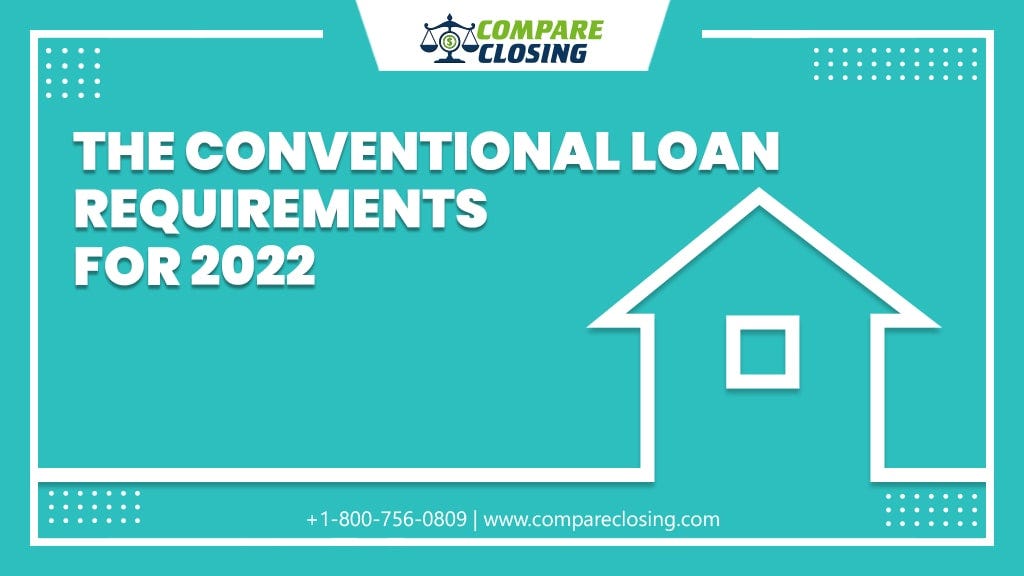
About Conventional Loan Requirements
If you are looking to buy a new home or refinance your current mortgage in 2022 using a conventional loan, there might be some updates since you last checked with the conventional loans.
What are the conventional loan requirements for 2021/2022? In this post, we will see the updated conventional loan requirements like conventional loan down payment or minimum down payment for a conventional loan, credit score for a conventional loan, etc.
What Is A Conventional Loan?
A conventional loan is a mortgage loan that is not backed by any government like FHA, VA, or USDA loans.
It is actually backed by investors and the insurance is paid by the borrowers. Conventional loans are a lot more common than FHA loans.
Conventional Loan Requirement For Minimum Credit Score
The conventional loan has a minimum credit score set at 620. It might be hard to find investors who do 620 scores depending on the down payment or loan to value and property type.
Though the guideline allows a minimum of 620 credit scores for a conventional loan, there are many lenders who have overlays on their programs that don’t allow them to go down to a 620 credit score.
But the higher the score more preferable the loan terms would be in your favor.
Conventional Loan Requirement For Minimum Down Payment
The minimum down payment for a conventional loan is 3%. However with a conventional loan, the more money you put down, the better is going to be.
When you put up to 10 % down on a conventional loan, the terms of the loan could be better than an FHA loan.
Whether FHA or conventional, if you are putting less than 20%, you will have to pay mortgage insurance or private mortgage insurance.
But with conventional loans, as soon as you reach the 20 % equity the mortgage insurance can be removed.
Whereas with FHA loans, you have to continue the mortgage insurance till the life of the loan.
Hence many people refinance their mortgage and get a conventional loan once they know that they have 20% or more equity in their house.
Conventional Loan Requirement For Property Occupancy Type
One of the great things about conventional loans is that you can get conventional loans for any of the occupancy types like a primary residence, secondary residence, investment property.
The 3% down payment is only for Primary residence. For secondary and investment properties the down payment requirement is higher.
Conventional Loan Requirements For Loan Limits
Conventional loans do have a loan limit requirement depending on where you are located. In the country, the base loan amount is $647,200 so that is going to cover the majority of areas out there.
But if you live in a high-cost area the conventional limit could be up to $970,800. The conventional loan limits are also set according to the number of units in your home.
This loan limit constantly changes, to know the updated on you can visit the link (click here)
Conventional Loans Requirement For Income / Employment
With any type of loan program, you are going to need steady employment. You are going to traditionally need 2 years of employment in the same line of work.
This is common for all types of loans including conventional loans. The lender wants to see some consistency in your employment and your income.
Your income can increase over time and they are likely to take an average of it. Unless there is a major hike or drop in your income and then they might consider the most recent one.
They are also going to see some assets, like your 401k, stock accounts, checking accounts, saving accounts.
They want to see if you have money in the bank and from where the down payment is coming from.
Conventional Loans Requirement For Debt To Income
In a conventional loan, the debt to income is required to be less than 50%. This means the payment of your debts should not be more than 50% of your total monthly income.
Conclusion
If you are looking to buy a property or refinance using a conventional loan we would recommend you speak to a mortgage professional as the conventional loans have a lot of flexibility when it comes to qualifying.
The right loan officer would be able to let you know all the conventional loan requirements so that you can make an informed decision.
https://www.compareclosing.com/blog/conventional-loan-requirements-2022/
Comments
Post a Comment